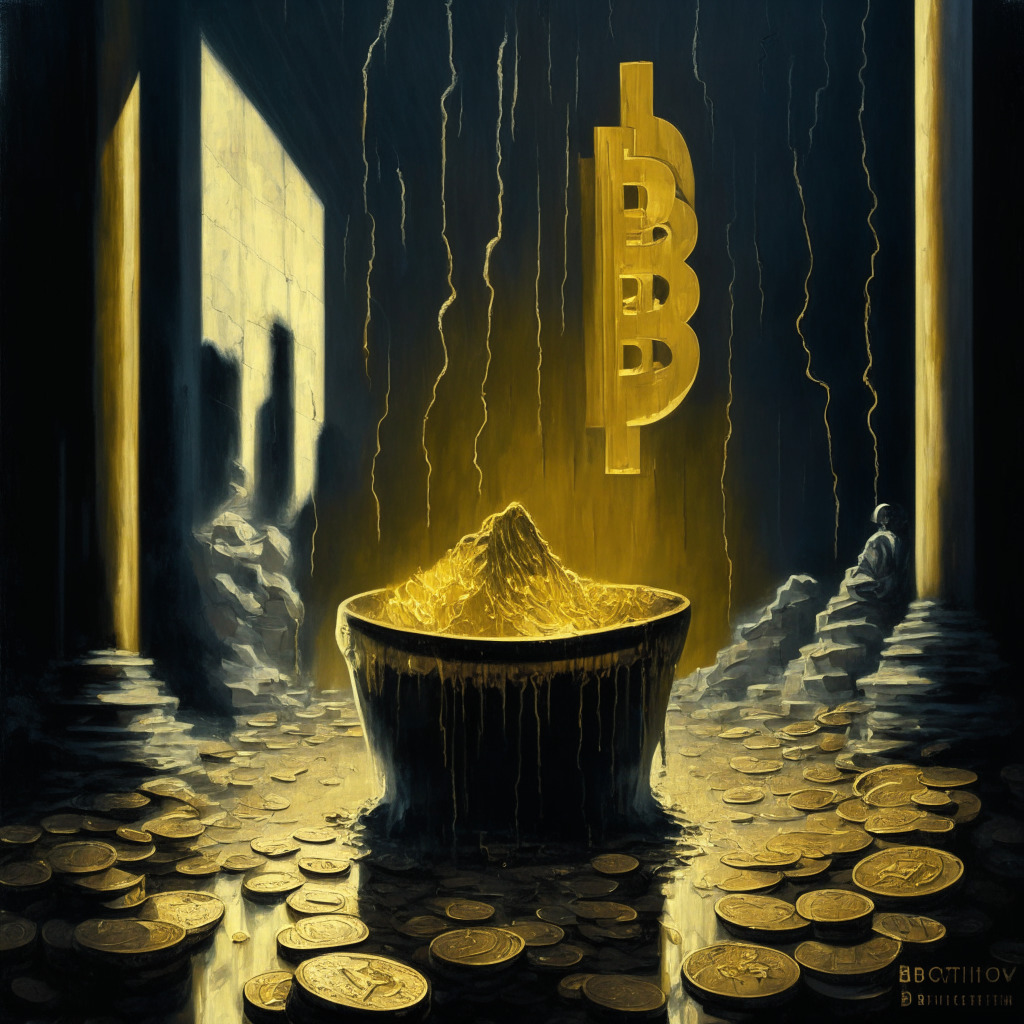“The blockchain analytics platform, Nansen, recently faced a cyber attack, compromising nearly 7% of the customer’s data. This breach exposed user’s email addresses, hashed passwords, and blockchain wallet addresses, marking a significant insecurity in blockchain technology. Nansen’s security appears leaky as the crypto industry experiences rampant and escalating cyberattacks.”
Search Results for: Nansen
Nansen Blockchain Breach: Spotlight on Crypto Security and Potential for Innovation
Recently, blockchain analytics company, Nansen, experienced a security breach, impacting approximately 6.8% of its users. This incident emphasizes the urgent need for robust security systems, data protection, and a balance between blockchain possibilities and its inherent risks.
Nansen and Kaiko: Uniting Data for Deeper Crypto Market Insights – A Double-Edged Sword?
Nansen and Kaiko’s partnership aims to provide comprehensive insights into transactions across centralized and decentralized exchanges. This collaboration offers a “holistic view” of the cryptocurrency market, allowing users to access combined datasets and make more informed investment decisions. However, the dominance of centralized exchanges raises concerns about their influence on the entire market.
Nansen Layoffs: A Cautionary Tale for Crypto Industry & Implications of Scaling Too Quickly
Nansen, a blockchain analytics firm, announced plans to cut 30% of its staff due to rapid scaling and challenging crypto market conditions. This downsizing reflects an industry-wide trend, emphasizing the need for strategic growth and long-term sustainability in the face of uncertainties.
Nansen Layoffs and Crypto Industry Challenges: Adapting to Market Volatility and Uncertainty
Nansen, a blockchain analytics platform, recently announced a 30% workforce reduction due to rapid scaling beyond their core strategy and the ongoing crypto bear market. This raises concerns on the sustainability of businesses within the crypto industry and the impact of market fluctuations on workforce stability.
Nansen’s Layoffs: Analyzing Cost Management in a Volatile Crypto Market and Its Impact
Blockchain data analytics platform Nansen cuts its workforce by 30% due to the ongoing cryptocurrency market slump. CEO Alex Svanenik admits unsound rapid scaling led to a high cost base, resulting in organizational changes for sustainability.
Layoffs at Ledger and Beyond: Reflecting on Job Cuts in the Crypto Industry Amid Market Uncertainty
Ledger, a hardware crypto wallet manufacturer, has announced plans to lay off 12% of its workforce, equating to about 88 job losses. CEO Pascal Gauthier attributed this decision to a challenging macroeconomic environment and to ensure business longevity.
Alameda’s Dubious Token Transfers and FTX’s Collapse: A Case for Crypto Regulation
Alameda Research transferred a massive $4.1 billion in FTT tokens to FTX exchange before its bankruptcy. This move, along with other dubious on-chain activities and the substantial control over FTT token supply, may have fueled their mutual financial balance sheets. These alarming transactions highlight the urgent need for transparent, comprehensive financial disclosures and tighter regulations in the blockchain networks.
PayPal’s Integration with Crypto.com: Pioneer Move or Futile Endeavor?
The cryptocurrency exchange Crypto.com and financial powerhouse PayPal have partnered, with Crypto.com becoming an exchange of choice for PayPal’s stablecoin, PYUSD. By facilitating PYUSD trading pairs, Crypto.com aims to connect over 80 million users to new crypto innovations while supporting PayPal’s extensive network.
CoinShares’ Bold Move into the US Amid Regulatory Uncertainty and Security Concerns
“CoinShares, a major European crypto asset firm, is establishing a U.S. hedge fund division to cater to the increasing demand for crypto-based products. Despite regulatory challenges, CoinShares aims to seamlessly connect the traditional finance sector with the digital asset industry, offering a range of investment products.”
Revamping Ethereum’s Staking Infrastructure: Is SSV.network the Solution to Pool Decentralization and Key Security?
“SSV.network, in partnership with the Ethereum Foundation, recently launched its mainnet aiming to decentralize Ethereum staking pools. Leveraging Distributed Validator Technology, it aims to increase validator resilience, enhance private key security, and minimize the risks of validator downtime.”
Breaking Barriers: The Call for Greater Inclusivity and Regulatory Balance in the Crypto Space
MobileCoin CEO, Sara Drakeley, emphasizes the need for broader inclusivity, especially for women, in the crypto industry. She maintains that subtle changes could increase women’s participation in crypto, highlighting opportunities for balancing privacy, transparency, and inclusivity. Drakeley also discusses the growth of MobileCoin and anticipates significant shifts in crypto regulations.
Balancing Privacy and Transparency: A Reshaping Future for Blockchain Regulations
Blockchain CEO Alex Svanevik discusses the challenge of balancing privacy and transparency within the blockchain sphere. Emphasizing that no protocol currently exists that fits perfectly on the scale, Svanevik predicts future blockchain projects will provide oscillating settings between transparency and privacy, based on situational requirements. These future protocols, he argues, should also be acceptable to regulators.
Navigating the Future: Exploring Recent Advances and Challenges in Blockchain and Crypto Industry
“BNB Chain developers launched opBNB’s mainnet, aiming to address blockchain’s congestion and high transaction costs. Nansen presented an AI-powered upgrade of its platform to track suspicious trades and monitor transfers. Ripple plans to hire internationally due to regulatory dissatisfaction. Telegram and TON Foundation announced a self-custodial crypto wallet, TON Space, while Opera launched a non-custodial stablecoin wallet in Africa.”
Unraveling Crypto Drama: The Polygon Wallet Case and Binance Executive Exits
The popular blockchain scaling solution, Polygon, recently had two wallets flagged for transferring substantial MATIC tokens to Binance, raising alarm for potential dumping. However, Polygon Labs founder refuted these allegations as a mislabeling error. The intricacies surrounding wallet flagging and token transfers remind crypto enthusiasts of the importance of in-depth understanding and avoiding premature judgment based solely on surface-level information.
PayPal’s PYUSD Stablecoin: A Turbo Boost or Damp Squib for Crypto Adoption?
PayPal’s recently launched stablecoin, PYUSD, appeared to have a slow start with 90% of it residing in Paxos Trust’s reserves and only 7% on crypto exchange wallets. However, despite the somewhat sluggish kick-off, it’s still early days; a shift in the crypto market could significantly change PYUSD’s future prospects.
NFT Market Slump: Downturn or Silver Lining in Disguise?
The NFT marketplaces have seen a downturn, with significant drops in transaction volume and prices, experiencing up to 25% losses. However, smaller, newer NFT projects are experiencing growth, suggesting potential innovation opportunities in the downturn.
Plunge in Floor Prices: An Analysis of NFT Market Behaviour and Future Predictions
“NFTs are experiencing a noticeable decline in their floor prices, exceeding a 25% drop in the past month. Furthermore, popular collections’ floor prices are decreasing: Bored Ape Yacht Club by 27%; DeGods by 55%; and Azuki, known for its ‘Elementals’ NFT, by 36%.”
Arbitrum’s Meteoric Rise and Airdrop Drama: A Tale of Blockchain Resilience and Risk
“In Q2 2023, Ethereum’s rollup, Arbitrum, faced a significant “sell-the-news” reaction after ARB airdrop caused a surge in user transactions. Despite an initial drop in ARB token’s price, there’s a steady rise in transactions, revealing increased organic engagement and Arbitrum’s potential in shaping the blockchain future.”
Crypto Whales Making Waves: Diving into their Investment Strategies and the Future of Blockchain
“Crypto whales have been investing heavily in Ethereum-compatible blockchain, Base, along with other layer 2 networks. These investors have shown a strong alignment towards crypto, bridging over 100 ETH and diversifying across various Ethereum scaling options. This trend reveals the swift shifts of attention and investments in the dynamic crypto world.”
Unraveling the Huobi Enigma: Sudden Whale Deposits Amid Market Uncertainty
Recent on-chain data shows two significant deposits made by a crypto whale into Huobi, potentially impacting the volatile crypto market. These deposits boosted Huobi’s USDT supply to a notable $273 million. Meanwhile, Huobi faces a contradictory situation with sustained outflows, amidst rumors of detainment of its executives in China. This demonstrates the complex and interconnected nature of the crypto market.
Huobi Exchange: Amid Rumours and Shrinking Balances, Where Does the Future Lie?
Rumors about Huobi, a cryptocurrency exchange platform, facing internal turmoil have led to a significant 33% drop in its stablecoin exchange balances, equating to a withdrawal of roughly $49 million. Despite denying these allegations, Huobi’s balances have decreased notably since the start of 2021, adding questionable to the overall health of the exchange.
Avalanche’s Paradox: Increasing Transactions Despite Shrinking User Funds
“In Q2, Avalanche, a major smart contract platform, saw a surge in usage but diminishing invested funds. Despite a crypto bear market, Avalanche displayed steady growth through increasing daily transactions and active addresses. A decrease in total money locked, however, suggests user caution, possibly due to market factors.”
Slowing in Ethereum Gas Consumption: A Spotlight on the Maturing NFT Market
“Data from Glassnode shows a significant drop in Ethereum gas consumption by NFT marketplaces, indicating a possible shift in NFT usage with more individuals choosing to hold their assets. However, this reflects market maturation and growing understanding of technology, rather than decline.”
Unmasking Anonymous Crypto With Arkham: Wintermute’s Increased Holdings Spark Curiosity
Wintermute Trading has recently removed over eight million ARKM tokens from Binance, increasing their position in the ARKM token by 731%. This positions them as the 10th largest holder of ARKM. Given their involvement with the dox-to-earn platform of Arkham Intelligence, speculation surrounds Wintermute’s intentions with these tokens.
Unmasking Crypto Anonymity: The Controversy and Consequences of Arkham Intel Exchange
Arkham Intel Exchange, a new platform offering monetary rewards for identifying anonymous crypto users, is sparking debate within the digital currency industry. Despite privacy concerns, many are utilizing the service to expose those behind major crypto exploits. Arkham exemplifies the intricate balance between crypto’s privacy struggle and the desire for transparency.
Pioneering the Web3 Era: A Golden Opportunity for Digital Marketers Amidst Challenges
“A comprehensive report by Web3’s marketing analytics firm, Safary, reveals potential growth for digital marketing in the Web3 ecosystem. Despite challenges posed by privacy and decentralization inherent in blockchain, numerous startups are developing strategies to leverage this new era of digital marketing.”
The Future of Blockchain: Balancing Innovation with Stability and Security
“China’s mobile payment giants, WeChat Pay and Alipay, have abolished the requirement of a local bank account for foreign visitors, enabling international credit cards. Meanwhile, royalty volumes for NFTs on the Ethereum Blockchain have significantly dipped, causing concerns about their sustainability. Banks in Korea are exploring CD tokens as a stable alternative. Crypto wallet, Zengo introduced a premium subscription, and discussions on security vulnerabilities in crypto are ongoing.”
Exploring Mantle’s Rise: Outpacing Rivals in the Layer-2 Blockchain Arena
“Mantle, an Ethereum layer-2 network, has seen its native token MNT surge by 4%, outpacing other major layer-2 blockchains. The distinctive three-layer modular approach of Mantle, which was previously BitDAO, seems to be setting a market precedent. However, market superiority remains undecided due to fluctuating token prices.”
Bitget’s Staggering $1.44 Billion Reserve Ratio: Financial Fortitude or Overcautious Strategy?
Crypto exchange Bitget declares a debt-free status and remarkable reserves totalling $1.44 billion, exceeding the industry-standard backing with a reserve ratio of 223%. Built through transaction fee profits and returns from investments, Bitget seeks to maintain transparency and reinforce trust by issuing monthly proof-of-reserve statements. The exchange also initiates a crypto lending program, enabling users to maximize investment possibilities.
NFT Royalties on a Downtrend: A Blow to Creators or a Necessary Adjustment for Market Stability?
NFT royalty payments have dramatically declined, hitting a two-year low in June, according to data analytics platform, Nansen. A growing trend of royalty-optional marketplaces and policies of established platforms like OpenSea seem to influence this dwindling trend. Despite the radical drop, certain ‘blue-chip’ collections continue earning millions in royalties.
Crypto Lending: An Alluring Risk or a Profitable Venture in the New Financial Landscape?
Bitget, a crypto derivatives exchange, has introduced a crypto lending program providing loans in alternative cryptocurrency. Users stake their coins as collateral, mirroring traditional lending practices. This allows expansion of investment portfolios, however, the risk of hacking and fraud is an inherent vulnerability.































